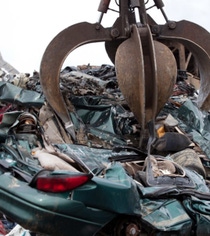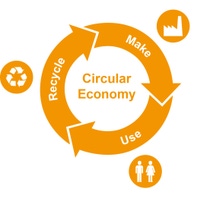Performance Polymers
Giving plastics a new lease on life
Dem Kunststoff ein neues Leben schenken
Increasing the use of recycled raw materials is an important lever to reduce CO2 emissions in the supply chain
In Germany, almost half a million cars reach the end of their life cycle each year, with the majority ending up at recycling plants and the rest at scrapyards. In recycling plants, the vehicles are disassembled and many materials and parts are reused. This includes various metals, copper wires from cables, as well as plastics, which can be restored by means of mechanical recycling. All recycling methods have one thing in common: They must meet the high requirements of the automotive industry. As such, some of the plastics are incinerated since they cannot be reused due to contamination or impurities.
Cooperation with BMW and ALBA Group
A joint project initiated by BMW and various companies of the ALBA Group intends to change this. In order to expand the circular economy and further reduce the use of primary materials in the automotive industry, the ALBA Group takes old vehicles and, in a first step, removes the components that can be mechanically recycled.
The remaining plastic parts are then shredded together with the vehicles, ending up as shredder residue. From this fraction, the ALBA Group then separates as many materials as possible that can also be mechanically recycled. As part of the project, BASF then analyzes the remaining plastic residues and checks whether the plastic mix can be used in chemical recycling. If this is the case, the plastic waste could then serve as a raw material for pyrolysis oil used at BASF. This oil is set to replace fossil raw materials in the BASF Verbund and will be used to produce plastics with the same quality as new products.

As part of our projects on automotive shredder residue, our goal is to further strengthen the circular economy with a solution that supplements mechanical recycling. Together with our partners, we hope to give the materials a second lease on life and keep the cycle going. This will enable us to reduce fossil raw materials and make a significant contribution to curbing CO2 emissions by avoiding incineration processes.
Rethinking plastic recycling from end-of-life vehicles

Another project focuses on optimizing the sorting and recycling of plastics in old vehicles using cutting-edge technologies. BASF SE and the Institute for Applied Ecology are working together with Volkswagen AG, SICON GmbH and the Clausthal University of Technology on a project sponsored by the Federal Ministry of Education and Research.
In this project, partners from industry and academia are developing a comprehensive approach for separating the highly complex mix of materials. Customized mechanical, chemical and thermal treatment processes will be used to manage and recycle automotive plastics in line with market requirements.
The circular economy plays a key role within the scope of the European Green Deal.
Improved sorting methods and chemical recycling as a complementary solution to mechanical recycling can help increase the amount of plastics recycled from old vehicles and improve the share of recycled plastics used in new vehicles. At the same time, the profitability of recycling plastics from old vehicles is increased. The results are used as a baseline for a comprehensive implementation phase in a follow-up project. The processes established in pilot plants will then be optimized, developed further and combined to provide the best solution for various subfractions.

